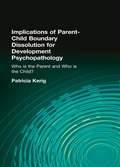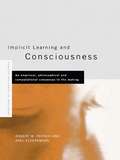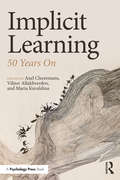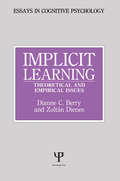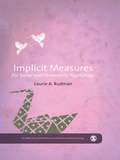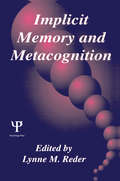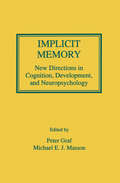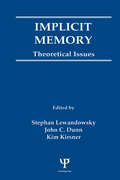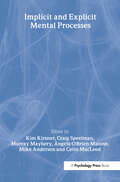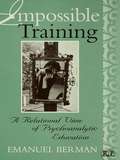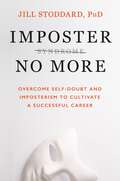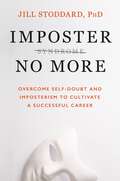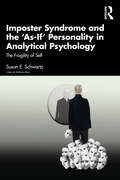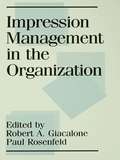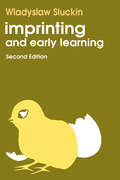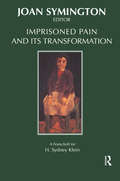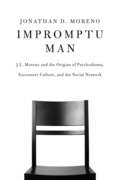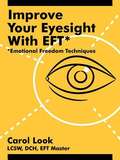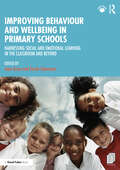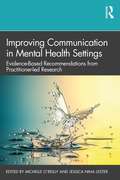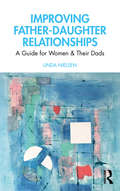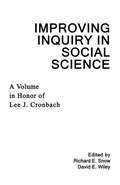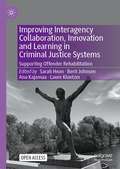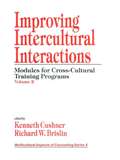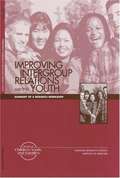- Table View
- List View
Implications of Parent-Child Boundary Dissolution for Developmental Psychopathology: "Who Is the Parent and Who Is the Child?"
by Patricia K. KerigGain a better understanding of parent-child boundaries and the mechanisms for their dissolutionThe breakdown of appropriate generational boundaries between parent and child can threaten the child&’s psychological development. Implications of Parent-Child Boundary Dissolution for Developmental Psychopathology: Who Is the Parent and Who Is the Child? explores this covert and oftentimes ignored form of emotional abuse, discussing in detail the various ways it can manifest. This revealing text comprehensively examines how the burden of meeting the emotional needs of the parent interferes with the child&’s healthy development. The boundary dissolution patterns of role reversal, enmeshment, psychological control, and triangulation are closely examined with an eye toward providing appropriate strategies for dealing with the problem.Implications of Parent-Child Boundary Dissolution for Developmental Psychopathology is separated into four sections to focus extensively on every aspect of the problem. The first section discusses definitions, concepts, and methodological concerns of the phenomena, including a consideration of the child&’s developmental responses to boundary dissolution. The second section explores the empirical research concerning boundary dissolution within the family system, and includes intriguing information on the actual mechanism that passes the pattern of role reversal on to the following generation. The next section closely examines boundary violations within high-risk families, with a focus on those undergoing divorce. The final section concentrates on cultural contexts of boundary dissolution and includes a look at the perception of familial responsibility and its effects on Bosnian youths. This one-of-a-kind resource is extensively referenced, and provides a solid foundation to inspire a new generation of theory, research, and clinical work.Implications of Parent-Child Boundary Dissolution for Developmental Psychopathology examines: a multidimensional model of boundary dissolution-with supporting research a comprehensive review of published literature in the areas of attachment theory, developmental capacities of the infant, child-rearing practices, and parental beliefs the theoretical background supporting the construct of boundary dissolution the boundary disturbance patterns of enmeshment and control the relationships between interparental conflict, parental responses to children&’s emotions, and representations of role reversal and vulnerability in children&’s family drawings the &’spill over&’ effect of marital conflict role reversal in high-risk families children&’s rejection of one parent over another in custody disputes post-war adjustment of Bosnian adolescents psychological control in individualist and collectivist groups representations of parents and children in twentieth century American novelsImplications of Parent-Child Boundary Dissolution for Developmental Psychopathology is crucial reading for researchers and clinicians who deal with families and psychopathology and is of particular interest to graduate students in clinical child psychology, child and family studies, social work, and developmental psychology.
Implicit Learning and Consciousness: An Empirical, Philosophical and Computational Consensus in the Making (Frontiers of Cognitive Science)
by Axel Cleeremans Robert M. FrenchCan you learn without knowing it? This controversial and much debated question forms the basis of this collection of essays as the authors discuss whether the measurable changes in behaviour that result from learning can ever remain entirely unconscious. Three issues central to the topic of implicit learning are raised. Firstly, the extent to which learning can be unconscious, and therefore implicit, is considered. Secondly, theories are developed regarding the nature of knowledge acquired in implicit learning situations. Finally, the idea that there are two separable independent processing systems in the brain, for implicit and explicit learning, is considered.Implicit Learning and Consciousness challenges conventional wisdom and presents the most up-to-date studies to define, quantify and test the predictions of the main models of implicit learning. The chapters include a variety of research from computer modelling, experimental psychology and neural imaging to the clinical data resulting from work with amnesics. The result is a topical book that provides an overview of the debate on implicit learning, and the various philosophical, psychological and neurological frameworks in which it can be placed. It will be of interest to undergraduates, postgraduates and the philosophical, psychological and modeling research community.
Implicit Learning: 50 Years On
by Axel Cleeremans Viktor Allakhverdov Maria KuvaldinaCan we learn without knowing we are learning? To what extent is our behavior influenced by things we fail to perceive? What is the relationship between conscious and unconscious cognition? Implicit Learning: 50 Years On tackles these key questions, fifty years after the publication of Arthur Reber’s seminal text. Providing an overview of recent developments in the field, the volume considers questions about the computational foundations of learning, alongside phenomena including conditioning, memory formation and consolidation, associative learning, cognitive development, and language learning. Featuring contributions from international researchers, the book uniquely integrates ‘Western’ thinking on implicit learning with insights from a rich Russian research tradition. This approach offers an excellent opportunity to contrast perspectives, to introduce new experimental paradigms, and to contribute to ongoing debates about the very nature of implicit learning. Implicit Learning: 50 Years On is essential reading for students and researchers of consciousness, specifically those interested in implicit learning.
Implicit Learning: Theoretical and Empirical Issues (Essays in Cognitive Psychology)
by Zoltan Dienes Dianne C. BerryThere is considerable debate over the extent to which cognitive tasks can be learned non-consciously or implicitly. In recent years a large number of studies have demonstrated a discrepancy between explicit knowledge and measured performance. This book presents an overview of these studies and attempts to clarify apparently disparate results by placing them in a coherent theoretical framework. It draws on evidence from neuropsychological and computational modelling studies as well as the many laboratory experiments.Chapter one sets out the background to the large number of recent studies on implicit learning. It discusses research on implicit memory, perception without awareness, and automaticity. It attempts to set the implicit - explicit distinction in the context of other relevant dichotomies in the literature. Chapter two presents an overview of research on the control of complex systems, from Broadbent (1977) through to the present day. It looks at the accessibility of control task knowledge, as well as whether there is any other evidence for a distinction between implicit and explicit modes of learning. Chapter three critically reviews studies claiming to show that people can acquire concepts without being verbally aware of the basis on which they are responding. It shows that concept formation can be implicit in some sense but not in others. Chapter four investigates the claim that people can learn sequential information in an implicit way. Chapter five looks at whether computational modelling can elucidate the nature of implicit learning. It examines the feasibility of different exemplar connectionist models in accounting for performance in concept learning, sequence learning, and control task experiments. Chapter six reviews evidence concerning dissociations between implicit and explicit knowledge in various neuropsychological syndromes. Finally, chapters seven and eight discuss the many practical and theoretical implications of the research.
Implicit Measures for Social and Personality Psychology (The SAGE Library of Methods in Social and Personality Psychology)
by Laurie A. RudmanIncreasingly used by behavioural and social scientists, implicit measures afford investigating core psychological constructs in ways that bypass people's willingness and ability to report their feelings and beliefs. Focused on two primary assessment tools, evaluative priming and the Implicit Association Test, the Implicit Measures volume is designed for serious practitioners and beginning researchers alike. It provides an overview of each measure, describing its theoretical underpinnings and construct validity. Each chapter then lays out "best practices" for successfully designing each method and analyzing results, revealing how to avoid common pitfalls. The Implicit Measures volume will enable students of implicit measures to decide when and how to use them in their own research, and educate consumers of research about the accomplishments and challenges of using these state-of-the art assessment techniques.<P><P> The SAGE Library in Social and Personality Psychology Methods provides students and researchers with an understanding of the methods and techniques essential to conducting cutting-edge research. <P> Each volume within the Library explains a specific topic and has been written by an active scholar (or scholars) with expertise in that particular methodological domain. Assuming no prior knowledge of the topic, the volumes are clear and accessible for all readers. In each volume, a topic is introduced, applications are discussed, and readers are led step by step through worked examples. In addition, advice about how to interpret and prepare results for publication are presented.
Implicit Memory and Metacognition (Carnegie Mellon Symposia on Cognition Series)
by Lynne M. RederMetacognition is a term that spans many sub-areas in psychology and means different things to different people. A dominant view has been that metacognition involves the monitoring of performance in order to control cognition; however, it seems reasonable that much of this control runs implicitly (i.e., without awareness). Newer still is the field of implicit memory, and it has different connotations to different sub-groups as well. The editor of this volume takes it to mean that a prior experience affects behavior without the individual's appreciation (ability to report) of this influence. Implicit memory and metacognition seem to be at two opposite ends of the spectrum -- one seemingly conscious and control-oriented, the other occurring without subjects' awareness. Do these processes relate to each other in interesting ways, or do they operate independently without reference to each other? The relatively novel conjecture that much of the control of cognition operates at an implicit level sparked Reder's desire to explore the interrelationship between the two fields. Developed within the last two decades, both fields are very new and generate a great deal of excitement and research interest. Hundreds of articles have been written about metacognition and about implicit memory, but little if any material has been published about the two areas in combination. In other words, Metacognition and Implicit Memory is the first book attempting to integrate what should be closely linked efforts in the study of cognitive science.
Implicit Memory: New Directions in Cognition, Development, and Neuropsychology
by Peter Graf Michael E. J. MassonThe immense growth of research on implicit and explicit memory is making it difficult to keep up with new methods and findings, to gauge the implications of new discoveries, and to ferret out new directions in research and theory development. The present volume provides a status report of work on implicit and explicit memory in the three areas that have contributed the bulk of what is known about this domain -- cognitive psychology, lifespan developmental psychology, and neuropsychology. Highlighting developments in methods, critical findings, and theoretical positions, this volume outlines promising new research directions. By so doing, it provides the reader with a multi-disciplinary perspective on implicit and explicit memory, and thereby enables a cross- fertilization of ideas and research. The chapters that make up this volume were written by experts on the topic of implicit and explicit memory. These contributors were asked to write for a broad audience -- for their colleagues from allied disciplines, for new researchers, for advanced undergraduate and graduate students -- to help them gain a comprehensive overview of the mushrooming research on this topic, grasp the most fundamental empirical and theoretical issues, and focus on new research directions.
Implicit Memory: Theoretical Issues
by Stephan Lewandowsky John C. Dunn Kim KirsnerThe first to focus exclusively on implicit memory research, this book documents the proceedings of a meeting held in Perth, Australia where leading researchers in the field exchanged ideas, data, and predictions about theoretical issues. In addition to reporting new information on a variety of topics, integrating previous findings, and proposing new theoretical approaches to implicit memory, the book also contains critical commentaries by highly regarded area specialists.
Implicit and Explicit Mental Processes
by Mike Anderson Kim Kirsner Craig Speelman Murray Maybery Angela O’Brien-Malone Colin MacLeodThe need for synthesis in the domain of implicit processes was the motivation behind this book. Two major questions sparked its development: Is there one implicit process or processing principle, or are there many? Are implicit memory, learning, and expertise; skill acquisition; and automatic detection simply different facets of one general principle or process, or are they distinct processes performing very different functions? This book has been designed to cast light on this issue. Because it is impossible to make sense of implicit processes without taking into account their explicit counterparts, consideration is also given to explicit memory, learning, and expertise; and controlled processing. The chapter authors consider principles, processes, and models which stand above a wealth of data collected to evaluate models designed specifically to account for data from a specific paradigm, or even more narrowly, from a specific experimental task. The motivation behind this approach is the proposition that modeling is possible for a much broader data domain, even though there may be some cost where specific tasks are concerned. The aim of this book is to treat synthesis as the objective, and to approach this objective by collecting and discussing phenomena which--although they are drawn from diverse areas of psychological science--touch a single issue concerning the distinction between explicit and implicit processes.
Impossible Training: A Relational View of Psychoanalytic Education (Relational Perspectives Book Series #26)
by Emanuel BermanOver the past century psychoanalysis has gone on to establish training institutes, professional societies, accreditation procedures, and models of education, thus bringing into uneasy alliance all three impossible pursuits. In Impossible Training: A Relational View of Psychoanalytic Education, Emanuel Berman turns his attention to the current status and future prospects of this daunting project. Berman is ideally suited to tackle the impossibility of psychoanalytic education. A graduate of two psychoanalytic institutes, one in Israel and one in America, he has devoted much of his professional life to psychoanalytic education and the organizational issues embedded in it. In Impossible Training, Berman describes the complex emotional and organizational dynamics of psychoanalytic training. Placing these issues within the context of major controversies in psychoanalytic history, he shows how generations of students have either idealized a "proper analytic identity," which evolves into a persecutory ideal, or rebelled against these standards. Are such persecuting and infantilizing trends inherent in analytic training, he asks, or can psychoanalytic education transcend them through changes in its structure and rules? For Berman, the relational and intersubjective trends in contemporary psychoanalysis call for changes in analytic supervision, not least of which is heightened attentiveness to the many relationships that gain expression in the supervisory process. Envisioned in this relational manner, supervision can become a more personal experience, less guarded, and more conducive to the development of a fertile transitional space between supervisor and supervisee. Anchoring his consideration of the present in the controversies of the past, Berman concludes by considering the mission of psychoanalytic educators today: to provide trainees with the resources to cope creatively with the as yet unknown challenges of tomorrow.
Imposter No More: Overcome Self-Doubt and Imposterism to Cultivate a Successful Career
by Jill, PhD StoddardA personal and professional guide to the latest research on imposterism and psychological flexibility, IMPOSTER NO MORE is the professional&’s handbook to combating &“impostor syndrome&” and overcoming self-doubt to achieve career success. Dr. Jill Stoddard is a recovered imposter. For years, she was convinced that the only reason she was accepted into a competitive grad school program was because her father knew the program director. Dr. Stoddard isn't alone in this: deep down, the majority of successful people question their professional legitimacy a good amount of the time. Why do we do this, and how can we stop? Although she's in recovery, Dr. Stoddard still struggles with feelings of imposterism. She works through them with psychological flexibility, the ability to be present with all thoughts, emotions, physical sensations, and urges, fully and without defense, while making conscious, deliberate choices based on what deeply matters to a person. Essentially, we're not attempting to change the substance of the thoughts and feelings that naturally occur to us; instead, we change the way we relate to those thoughts and feelings, so we aren't caught up in constant battle to control them. Throughout Imposter No More, Dr. Stoddard lays the groundwork for understanding the imposter phenomenon; she outlines the traps professionals often fall into regarding their imposter feelings, and provides actionable steps for cultivating psychological flexibility to be able to choose bold career moves despite self-doubt and imposterism.
Imposter No More: Overcome Self-doubt and Imposterism to Cultivate a Successful Career
by Jill A. StoddardA personal and professional guide to the latest research on imposterism and psychological flexibility, Imposter No More is the professional's handbook to combatting 'impostor syndrome' and overcoming self-doubt to achieve career success. Dr Jill Stoddard is a recovered imposter. For years, she was convinced that the only reason she was accepted into a competitive grad school programme was because her father knew the programme director. Dr Stoddard isn't alone in this: deep down, the majority of successful people question their professional legitimacy a good amount of the time. Why do we do this, and how can we stop? Although she's in recovery, Dr Stoddard still struggles with feelings of imposterism. She works through them with psychological flexibility, the ability to be present with all thoughts, emotions, physical sensations and urges, fully and without defence, while making conscious, deliberate choices based on what deeply matters to a person. Essentially, we're not attempting to change the substance of the thoughts and feelings that naturally occur to us; instead, we change the way we relate to those thoughts and feelings, so we aren't caught up in constant battle to control them. Throughout Imposter No More, Dr Stoddard lays the groundwork for understanding the imposter phenomenon; she outlines the traps professionals often fall into regarding their imposter feelings, and provides actionable steps for cultivating psychological flexibility to be able to choose bold career moves despite self-doubt and imposterism.
Imposter Syndrome and The ‘As-If’ Personality in Analytical Psychology: The Fragility of Self
by Susan E. SchwartzThis insightful book explores the ‘as-if’ personality through the lens of Jungian analytical psychology, illuminating how the same forces that can disturb personal development relationally, socially and culturally are equally an impetus toward expressing and relating with one's more complete self. The book describes persons expressing an ‘as if’ personality as facing a conundrum around whether to hide or expose the truth of who they are. It describes the analytic container as a place of growth from that place, affecting person and culture, self and other. Using a myriad of clinical examples (across a range of cultures, contexts and personal experiences), the author describes people who are moving through feelings of not belonging, sexual addiction, ageing, the cultural influence of social media, the role of the father, and body image challenges. All these issues reveal the valuable recognition of the unconscious- a hallmark of Jungian analytical psychology- incorporates the dissociated others into selfhood. The theories of French psychoanalysts Andre Green on absence and the negative, Julia Kristeva on abjection, French philosopher Jacques Derrida on Narcissus and Echo and American philosopher Judith Butler on precarity expand the Jungian analytical thought to reflect the multiplicity of the psyche. Using understandable language to interweave various psychoanalytical and philosophical frameworks, Imposter Syndrome and the ‘As-If’ Personality in Analytical Psychology: The Fragility of Self is both accessible to general readers and highly relevant to professional analysts, therapists, clinicians and social workers.
Impression Management in the Organization
by Paul Rosenfeld Robert A. GiacaloneImpression management theory has been popular in sociology and social psychology for many years. This volume offers the first comprehensive application of impression management theory to organizational settings. Researchers and practitioners in organizational settings have recently been using this theory as an explanatory model to focus on the roles and identities that "social actors" utilize in interpersonal situations. The theory of impression management provides a framework for the techniques and strategies people use in order to look good as well as the excuses and justifications they employ to avoid looking bad.
Imprinting and Early Learning
by Wladyslaw SluckinWhat is imprinting and what role does it play in the early development of the individual? What is its theoretical importance for understanding the mechanisms of instinct and learning? What is its significance in the development of the young of our own species? This book attempts to answer all these questions.In recent years imprinting has attracted much interest. This has been in no small measure the result of the admirable writings of Konrad Lorenz. The continued interest in this field of research has been bound up with the realization among students of behavior that imprinting and imprinting-like processes may be highly significant in the ontogenetic development of very many species, possibly including our own. The study of imprinting has become an area of collaboration between zoologists, who were the initiators of the research, and psychologists, who promptly took it up and extended it.Imprinting and Early Learning is a compendium of the data and experimental reports on the youthful study of imprinting and early learning-a progress report that traces the history of interest in the theory of imprinting and similar processes, considers imprinting side by side with related concepts and empirical studies, reviews the full range of experiments that illuminate the characteristic nature of imprinting, elucidates the relationship of imprinting to conditioning and early learning, and points out the implications of imprinting for work in educational, social and abnormal psychology.
Imprisoned Pain and Its Transformation
by Joan SymingtonIn this chapter Anne Alvarez describes how supervision with Sydney Klein played a decisive part in transforming her understanding of the importance of the grammar of interpretation—that not all interpretations have to unmask hidden desires on the negative side but, rather, can help the evolving process of growth and understanding. This is particularly important in borderline patients in whom such unmasking interpretations may be ego-depleting in that they do not take into account the immediate meaning of the child’s communication.
Impromptu Man
by Jonathan D. Moreno"Impromptu Man captures the remarkable impact of a singular genius, J.L. Moreno, whose creations-the best-known being psychodrama-have shaped our culture in myriad ways, many unrecognized. The record will be set straight for all time by this can't-put-down biography, a tribute by Jonathan D. Moreno to his father's masterly legacy." -DANIEL GOLEMAN, author of Emotional Intelligence: Why It Can Matter More Than IQJ.L. Moreno (1889-1974), the father of psychodrama, was an early critic of Sigmund Freud, wrote landmark works of Viennese expressionism, founded an experimental theater where he discovered Peter Lorre, influenced Martin Buber, and became one of the most important psychiatrists and social scientists of his time. ??A mystic, theater impresario and inventor in his youth, Moreno immigrated to America in 1926, where he trained famous actors, introduced group therapy, and was a forerunner of humanistic psychology. As a social reformer, he reorganized schools and prisons, and designed New Deal planned communities for workers and farmers. Moreno's methods have been adopted by improvisational theater groups, military organizations, educators, business leaders, and trial lawyers. His studies of social networks laid the groundwork for social media like Twitter and Facebook. ??Featuring interviews with Clay Shirky, Gloria Steinem, and Werner Erhard, among others, original documentary research, and the author's own perspective growing up as the son of an innovative genius, Impromptu Man is both the study of a great and largely unsung figure of the last century and an epic history, taking readers from the creative chaos of early twentieth-century Vienna to the wired world of Silicon Valley.Jonathan D. Moreno, called the "most interesting bioethicist of our time" by the American Journal of Bioethics, is a professor at the University of Pennsylvania and a Senior Fellow at the Center for American Progress.
Improve Your Eyesight with Eft*: *Emotional Freedom Techniques
by Carol LookBased on an experiment conducted by EFT Master, Carol Look, "Improve Your Eyesight with EFT" invites you to improve your vision by releasing pent up emotions stored in your eyes. Emotions such as fear, guilt, anger and shame show up in every other part of our anatomy and physiology, why not in our eyesight? Considering that few doctors or lay people even entertain the idea that our eyesight could be improved by balancing our energy system with a simple method such as Emotional Freedom Techniques (EFT), the final results of the experiment were nothing short of fantastic. Approximately 75% of participants reported between a 15-75% improvement in their vision. . just from tapping on acupressure points while focusing on their emotions! EFT is the ideal tool to address emotional blocks that have been preventing you from seeing clearly.
Improving Behaviour and Wellbeing in Primary Schools: Harnessing Social and Emotional Learning in the Classroom and Beyond
by Jean Gross Sarah SeleznyovThis accessible resource provides a vivid and practical guide to social and emotional learning and will help primary schools tackle and improve behaviour and wellbeing. With content written by teachers and used successfully in real classrooms, chapters include powerful stories from teachers about their work and the impact it has had. Developed within a theoretical framework of evidence-based strategies, the resources included are fully illustrated with photographs from classrooms and draw upon a useful bank of downloadable resources and proformas. Taking the reader through a journey of how a group of schools worked together to develop practical and effective approaches, this essential resource features: Tried and tested strategies for improving behaviour and wellbeing Ready-to-use classroom resources – lesson slides; top picture-books for teaching about emotions; 20 simple exercises to help children stay calm; playground conflict resources and a progression in learning emotion vocabulary from Reception to Year 6 Powerful stories from individual teachers about their work and its impact An in-depth understanding of research evidence on what works in tackling social, emotional and mental health needs from best-selling author and expert Jean Gross Children’s social, emotional and mental health needs have never been of more concern to teachers than they are now — this book genuinely brings theory to life and is essential reading for today’s primary teachers, SENCOs, support staff and safeguarding leads.
Improving Communication in Mental Health Settings: Evidence-Based Recommendations from Practitioner-led Research
by Michelle O’ReillyImproving Communication in Mental Health Settings draws on empirical studies of real-world settings to demonstrate contemporary practice-based evidence, providing effective strategies for communicating with patients/clients in mental health settings. The book integrates clinical experience and language-based evidence drawn from qualitative research. Drawing on studies that utilize scientific language-based approaches such as discourse and conversation analysis, it focuses on social interaction between professionals and patients/clients to demonstrate effective communication practices. Chapters are led by clinical professionals and feature a range of mental health settings, different mental health conditions and types of patient/client, and evidence-based recommendations. This book is an essential guide for professionals working in mental health and/or social work, and those training or working in clinical areas of mental health practice.
Improving Father-Daughter Relationships: A Guide for Women and their Dads
by Linda NielsenImproving Father-Daughter Relationships: A Guide for Women and Their Dads is essential reading for daughters and their fathers, as well as for their families and for therapists. This friendly, no-nonsense book by father-daughter relationships expert, Dr. Linda Nielsen, offers women and their dads a step-by-step guide to improve their relationships and to understand the impact this will have on their well-being. Nielsen encourages us to get to the root of problems, instead of dealing with fallout, and helps us resolve the conflicts that commonly strain relationships from late adolescence throughout a daughter’s adult years. Showing how we can strengthen bonds by settling issues that divide us, her book explores a range of difficult issues from conflicts over money, to the daughter’s lifestyle or sexual orientation, to her parents’ divorce and dad’s remarriage. With quizzes and real-life examples to encourage us to examine beliefs that are limiting or complicating the connection between fathers and daughters, this guide helps us feel less isolated and enables us to create more joyful, honest, enriching relationships.
Improving Inquiry in Social Science: A Volume in Honor of Lee J. Cronbach
by David E. Wiley Richard E. SnowThis volume celebrates Lee J. Cronbach's considerable contributions to the methodology of social and behavioral science. Comprised of chapters written by colleagues and contemporaries of the highly influential scholar, it offers a range of ideas, perspectives, and new approaches to improving social science inquiry.
Improving Interagency Collaboration, Innovation and Learning in Criminal Justice Systems: Supporting Offender Rehabilitation
by Sarah Hean Berit Johnsen Anu Kajamaa Laure KloetzerThis Open Access edited collection seeks to improve collaboration between criminal justice and welfare services in order to help prepare offenders for life after serving a prison sentence. It examines the potential tensions between criminal justice agencies and other organisations which are involved in the rehabilitation and reintegration of offenders, most notably those engaged in mental health care or third sector organisations. It then suggests a variety of different methods and approaches to help to overcome such tensions and promote inter-agency collaboration and co-working, drawing on emerging research and models, with a focus on the practice in European and Scandinavian countries. For academics and practitioners working in prisons and the penal system, this collection will be invaluable.
Improving Intercultural Interactions: Modules for Cross-Cultural Training Programs, Volume 2
by Dr Richard W. Brislin Kenneth CushnerTaking an educational model for counselling, this volume presents training modules relevant for a variety of circumstances from the world of business to that of education. Included throughout are practical exercises and self-assessment questions which promote cultural awareness. The volume is a companion to Improving Intercultural Interactions - the third volume in the Multicultural Aspects of Counseling series. It builds upon Volume Three to address a new cluster of topics specific to various types of intercultural experience. These include: ethics; ethnocultural identification; conflict and mediation across cultures; empathy; and cross-cultural communication.
Improving Intergroup Relations Among Youth: Summary Of A Research Workshop
by Forum On AdolescenceA report on Improving Intergroup Relations Among Youth
